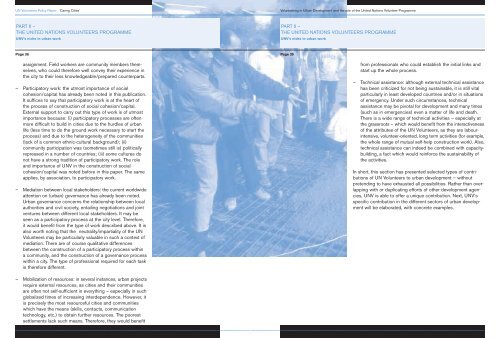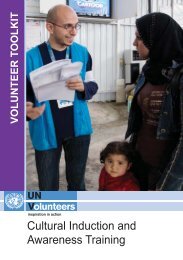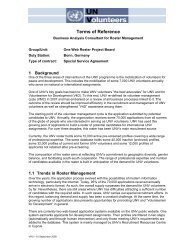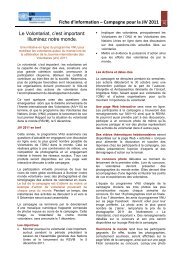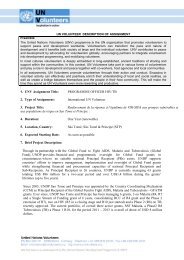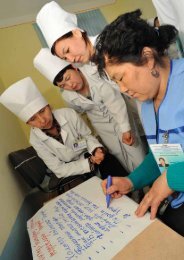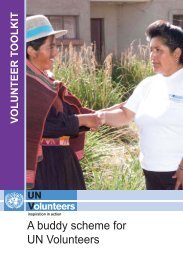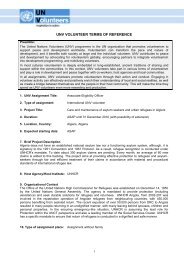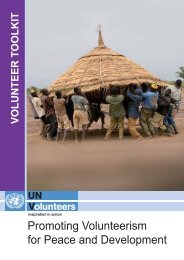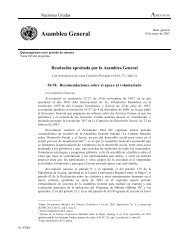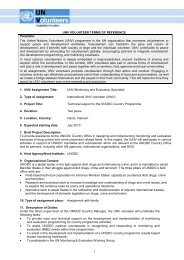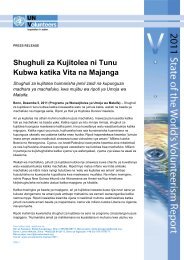View associated PDF document - United Nations Volunteers
View associated PDF document - United Nations Volunteers
View associated PDF document - United Nations Volunteers
You also want an ePaper? Increase the reach of your titles
YUMPU automatically turns print PDFs into web optimized ePapers that Google loves.
UN <strong>Volunteers</strong> Policy Paper<br />
‘Caring Cities’<br />
Volunteering in Urban Development and the role of the <strong>United</strong> <strong>Nations</strong> Volunteer Programme<br />
PART II –<br />
THE UNITED NATIONS VOLUNTEERS PROGRAMME<br />
UNV’s niche in urban work<br />
PART II –<br />
THE UNITED NATIONS VOLUNTEERS PROGRAMME<br />
UNV’s niche in urban work<br />
Page 38<br />
assignment. Field workers are community members themselves,<br />
who could therefore well convey their experience in<br />
the city to their less knowledgeable/prepared counterparts.<br />
– Participatory work: the utmost importance of social<br />
cohesion/capital has already been noted in this publication.<br />
It suffices to say that participatory work is at the heart of<br />
the process of construction of social cohesion/capital.<br />
External support to carry out this type of work is of utmost<br />
importance because: (i) participatory processes are often<br />
more difficult to build in cities due to the hurdles of urban<br />
life (less time to do the ground work necessary to start the<br />
process) and due to the heterogeneity of the communities<br />
(lack of a common ethnic-cultural background); (ii)<br />
community participation was (sometimes still is) politically<br />
repressed in a number of countries; (iii) some cultures do<br />
not have a strong tradition of participatory work. The role<br />
and importance of UNV in the construction of social<br />
cohesion/capital was noted before in this paper. The same<br />
applies, by association, to participatory work.<br />
– Mediation between local stakeholders: the current worldwide<br />
attention on (urban) governance has already been noted.<br />
Urban governance concerns the relationship between local<br />
authorities and civil society, entailing negotiations and joint<br />
ventures between different local stakeholders. It may be<br />
seen as a participatory process at the city level. Therefore,<br />
it would benefit from the type of work described above. It is<br />
also worth noting that the neutrality/impartiality of the UN<br />
<strong>Volunteers</strong> may be particularly valuable in such a context of<br />
mediation. There are of course qualitative differences<br />
between the construction of a participatory process within<br />
a community, and the construction of a governance process<br />
within a city. The type of professional required for each task<br />
is therefore different.<br />
Page 39<br />
from professionals who could establish the initial links and<br />
start up the whole process.<br />
– Technical assistance: although external technical assistance<br />
has been criticized for not being sustainable, it is still vital<br />
particularly in least developed countries and/or in situations<br />
of emergency. Under such circumstances, technical<br />
assistance may be pivotal for development and many times<br />
(such as in emergencies) even a matter of life and death.<br />
There is a wide range of technical activities – especially at<br />
the grassroots – which would benefit from the interactiveness<br />
of the attributes of the UN <strong>Volunteers</strong>, as they are labourintensive,<br />
volunteer-oriented, long term activities (for example,<br />
the whole range of mutual self-help construction work). Also,<br />
technical assistance can indeed be combined with capacitybuilding,<br />
a fact which would reinforce the sustainability of<br />
the activities.<br />
In short, this section has presented selected types of contributions<br />
of UN <strong>Volunteers</strong> to urban development – without<br />
pretending to have exhausted all possibilities. Rather than overlapping<br />
with or duplicating efforts of other development agencies,<br />
UNV is able to offer a unique contribution. Next, UNV’s<br />
specific contribution in the different sectors of urban development<br />
will be elaborated, with concrete examples.<br />
– Mobilization of resources: in several instances, urban projects<br />
require external resources, as cities and their communities<br />
are often not self-sufficient in everything – especially in such<br />
globalized times of increasing interdependence. However, it<br />
is precisely the most resourceful cities and communities<br />
which have the means (skills, contacts, communication<br />
technology, etc.) to obtain further resources. The poorest<br />
settlements lack such means. Therefore, they would benefit


